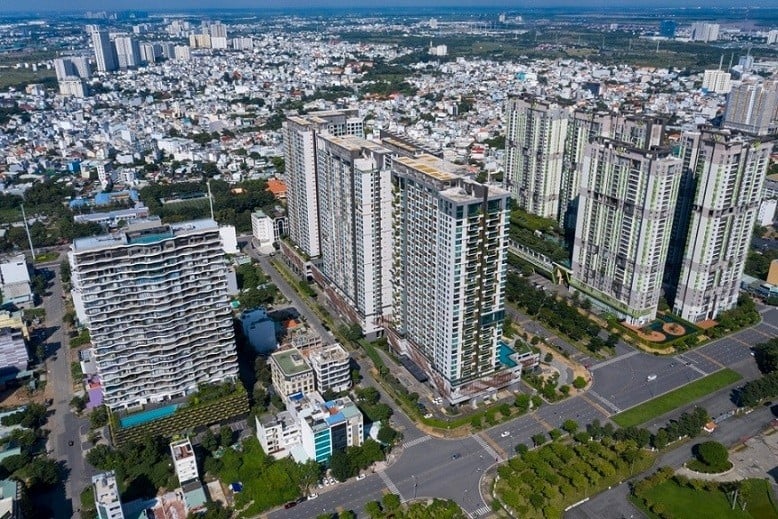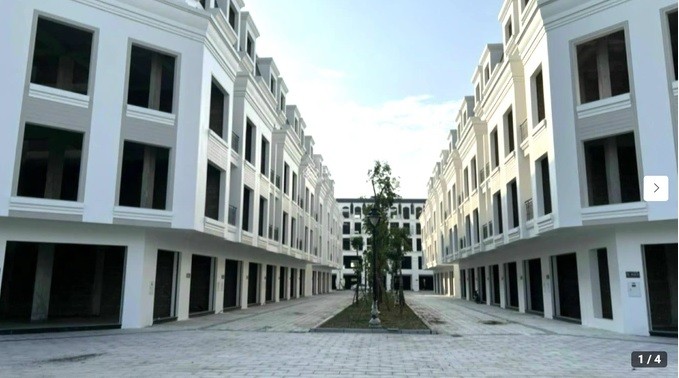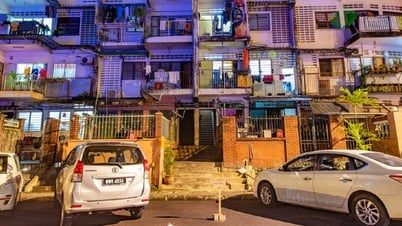 |
| The real estate industry is still facing many difficulties but may recover in the second half of 2024. (Source: SBV) |
Real estate market will flourish in the second half of 2024
One of the signals predicting a recovery in the real estate industry is that lending interest rates will decrease to a lower level, which will be the main driving force for the entire industry to recover. Currently, mobilization interest rates have been adjusted since the first quarter of 2023, but the development of lending interest rates is delayed.
According to WiGroup's report on business results in the second quarter of 2023, the real estate industry is still facing many difficulties but may recover in the second half of 2024.
Specifically, the growth in profit after tax (NPAT) in the second quarter of 2023 of the entire residential real estate industry (excluding Vinhomes) recorded a negative growth of about -46% over the same period, although the absolute value recorded an increase compared to the first quarter of 2023, but there was no really strong catalyst to boost the entire industry's profit to recover from the bottom.
Digging deeper into the growth analysis of 20 enterprises (accounting for 90% of the industry's capitalization), the data shows that only 5 real estate companies recorded positive growth in the second quarter.
But this comes from two main reasons: sudden growth from other profits and not from core business or high growth due to low profits in the same period.
Other large-cap companies in the industry all recorded a profit decline of over 20% compared to the same period, reflecting the general difficulties of the real estate market.
The value of inventories of the whole industry has decreased compared to the first quarter of 2023. Tight legal corridors and tightening credit flows into the real estate market are the two main reasons why businesses have difficulty implementing projects.
Demand is also not very optimistic when total real estate transactions in the second quarter of 2023 decreased by 66% compared to the same period last year and decreased by 9% compared to the previous quarter.
According to WiGroup, to ensure “survival”, real estate managers must implement a defensive strategy by reducing financial leverage to a safe level, reducing interest expenses and avoiding insolvency while sales activities slow significantly. As of the end of the second quarter of 2023, the total debt to interest ratio/equity of the entire industry reached 0.48 times.
Total interest expense during the period reached VND 2,030 billion, a slight increase compared to the first quarter, reflecting that lending interest rates are still quite high and show no signs of cooling down. The solvency of businesses in the industry, measured by the EBIT/Interest ratio, decreased compared to the first quarter of 2023.
One of the signals predicting a recovery in the real estate industry is that lending interest rates will decrease to a lower level, which will be the main driving force for the entire industry to recover. Currently, mobilization interest rates have been adjusted since the first quarter of 2023, but the development of lending interest rates is delayed.
In addition, the removal of legal corridors helps to reopen the real estate supply. The social housing segment can be a catalyst for the residential real estate industry as this segment benefits from many support policies of the Government .
“Accordingly, the recovery of the real estate market in general and the residential real estate industry in particular will fall around the second half of 2024 when support policies begin to permeate,” WiGroup assessed.
Approval of investment policy for Ho Son 3 residential area project
Vice Chairman of Lang Son Provincial People's Committee Luong Trong Quynh has just issued Decision No. 1282/QD-UBND approving the investment policy of Ho Son 3 Residential Area project, Huu Lung district, through the form of bidding to select investors.
According to the Decision, the scope of the Ho Son 3 residential area project includes: The North and Northeast border the provincial road DT.242 and the road leading to the Hanoi - Lang Son expressway; the South borders the Hanoi - Lang Son expressway; the East borders the current residential land of Ho Son commune and the People's Committee of Ho Son commune; the West and Southwest border the Thuong River.
The project's investment objective is to build a residential area with a synchronous and modern technical infrastructure system with works according to the approved planning. Fully exploit the existing land fund, meet the needs of all subjects with demand for residential land and housing, actively contribute to the Housing Development Program of Huu Lung district in particular and Lang Son province in general.
Ho Son 3 residential area project has a total investment capital (excluding compensation, support and resettlement costs) of VND 1,379 billion with a total land area of 400,000m2 (40 ha). The scale of the project includes the following items: High-rise housing with an area of 4,656m2, low-rise townhouses with a total land area of 111,392m2 (1,102 plots of land), low-rise villas with a total area of 20,510.7m2 (131 plots of land), resettlement housing with a total area of 8,216m2 (84 plots of land) and other works such as technical infrastructure, trade and service centers... The population size is 7,000 people.
The project's operating period is 50 years from the date the Investor receives the land allocation decision or land lease decision, in which the project implementation progress does not exceed 48 months.
Thai Nguyen: Resolutely collect debts related to land use fees and land rents
The Chairman of the People's Committee of Thai Nguyen province has just requested the Heads of departments, branches, and sectors, and Chairmen of the People's Committees of districts and cities to urgently and resolutely carry out a number of tasks to continue to synchronously implement solutions to urge the collection of debts related to land use fees and land rents in the province, striving to achieve the highest results in the task of collecting the State budget.
In 2023, the People's Council of Thai Nguyen province assigned the task of collecting 20,000 billion VND for the State budget, of which land use fees were 4,800 billion VND and land rent was 700 billion VND. As of July 31, land use fees in Thai Nguyen province were only 734,778 billion VND, reaching 15.3% of the provincial estimate, land rent reached 296,086 billion VND, equal to 42.3% of the provincial estimate.
According to the tax authority's announcement, the amount of land use fees that have been reported to be owed is 681,240 billion VND and the amount of land rental fees that have been reported to be owed is 94,865 billion VND at 14 residential and urban area projects.
Some of the reasons for the low land use fee collection of projects in Thai Nguyen province are determined to be due to the sluggish real estate market over the past year, causing low transaction rates; many businesses depend on loans and mobilized capital, while lending interest rates remain high and capital is difficult to access. Along with that, a number of taxpayers have not complied well with tax laws.
According to the plan of the Thai Nguyen Provincial Tax Department, by the end of September 2023 at the latest, projects with land use debt must fulfill their obligations to the State budget.
In Document No. 4151/UBND-KT dated August 18, the Chairman of the Thai Nguyen Provincial People's Committee assigned the Provincial Tax Department to: Implement debt collection measures appropriate to each tax debt case in accordance with regulations; especially focus on immediately applying measures to urge, enforce and publicize information in accordance with the provisions of the Law on Tax Administration and guiding documents for taxpayers with large tax debts, procrastination, and prolongation to recover tax debts to the State budget.
Direct subordinate units to closely inspect and monitor the progress of handling debts related to land use fees and land rents in the province; periodically report monthly to assess the situation of handling debts related to land use fees and land rents in the province, summarize difficulties and problems arising during the implementation process, report and advise the Provincial People's Committee to consider and direct in accordance with regulations.
People's Committees of districts and cities: Take the lead and coordinate with the Provincial Tax Department to directly work with enterprises that owe land use fees and land rents in the area to urge them to pay the State budget in a timely manner. Develop programs and assign specific tasks to departments, offices, and affiliated units to closely coordinate with the Regional Tax Department to focus on urging and thoroughly handling land-related debts.
Also according to the Chairman of the People's Committee of Thai Nguyen province: In case the auction winner does not pay or does not pay enough money for the land use right auction within 120 days from the date of the decision to recognize the auction result, the People's Committee at the competent level will cancel the decision to recognize the land use right auction result according to the provisions of Clause 2, Article 3 of Decree No. 10/2023/ND-CP dated April 3, 2023 of the Government.
Housing prices in Hanoi and Ho Chi Minh City are 18-32 times higher than income.
Savills has just released figures related to the ability to own a house of people in Hanoi and Ho Chi Minh City.
In particular, this unit cited the report on Housing Affordability Index in Asia Pacific 2023 of the Urban Land Institute (ULI) showing that Ho Chi Minh City and Hanoi are two cities with average housing prices in the region. However, the gap is quite large compared to people's income.
Specifically, in Ho Chi Minh City, the average house price is 296,000 USD (more than 7 billion VND) with the average income of a household at 9,120 USD/year (about 220 million VND).
 |
| State support policies are key in establishing housing affordability for people. (Source: Screenshot/DT) |
According to the report's calculation, the gap between housing prices and income in Ho Chi Minh City is at 32.5 times. This is the second highest in the region, after Shenzhen (35 times), even higher than Beijing (29.3 times), Shanghai (24.1 times) and Hong Kong-China (26.5 times).
Meanwhile, this index in Hanoi is 18.3 times with the average annual household income of 9,967 USD (about 240 million VND); higher than Seoul (17.3 times), Tokyo (16.1 times), and Singapore commercial housing (13.7 times).
In the rental housing market, the average monthly rent per apartment in Ho Chi Minh City is 592 USD, equivalent to more than 14 million VND. This market is mainly suitable for young workers with high income or foreigners working in Vietnam.
Analyzing the housing affordability of people in Ho Chi Minh City, Ms. Giang Huynh, Deputy Director, Head of Research and S22M Savills Ho Chi Minh City, said that most people can only afford affordable housing and affordable apartments.
According to Ms. Giang, affordable apartments priced at VND2-4 billion are currently in low supply. Previously, this product line accounted for about 60% of the market supply; in 2023, it will only account for about 25%. This affects people's opportunity to own a home.
Ms. Giang believes that the State's support policy is the key to establishing people's ability to pay for housing. Practical experience from many different countries has shown the positive impacts of housing solutions on socio-economic development.
“The Government’s consideration of taxes to limit speculative purchases and increase land funds for affordable housing development demonstrates its commitment to promoting a stable and sustainable housing market, benefiting homebuyers,” said Ms. Huynh.
Along with that, she said that developing social housing is a priority issue because it helps solve housing problems for low-income people, stimulates the socio-economy, speeds up population dispersion, expands urban areas to suburban areas, and increases sustainability in urban planning.
Source


![[Photo] Prime Minister Pham Minh Chinh and Prime Minister of the Kingdom of Thailand Paetongtarn Shinawatra attend the Vietnam-Thailand Business Forum 2025](https://vphoto.vietnam.vn/thumb/1200x675/vietnam/resource/IMAGE/2025/5/16/1cdfce54d25c48a68ae6fb9204f2171a)































![[Photo] President Luong Cuong receives Prime Minister of the Kingdom of Thailand Paetongtarn Shinawatra](https://vphoto.vietnam.vn/thumb/1200x675/vietnam/resource/IMAGE/2025/5/16/52c73b27198a4e12bd6a903d1c218846)





























































Comment (0)